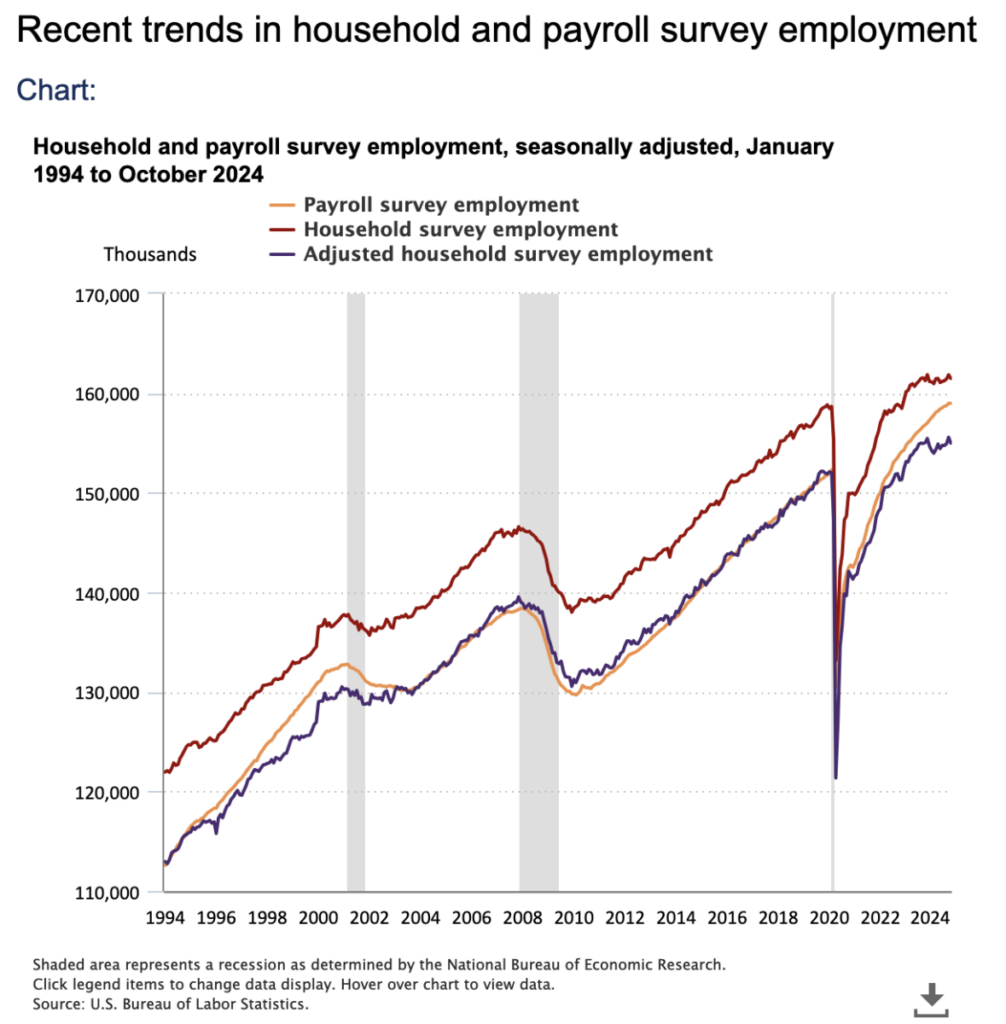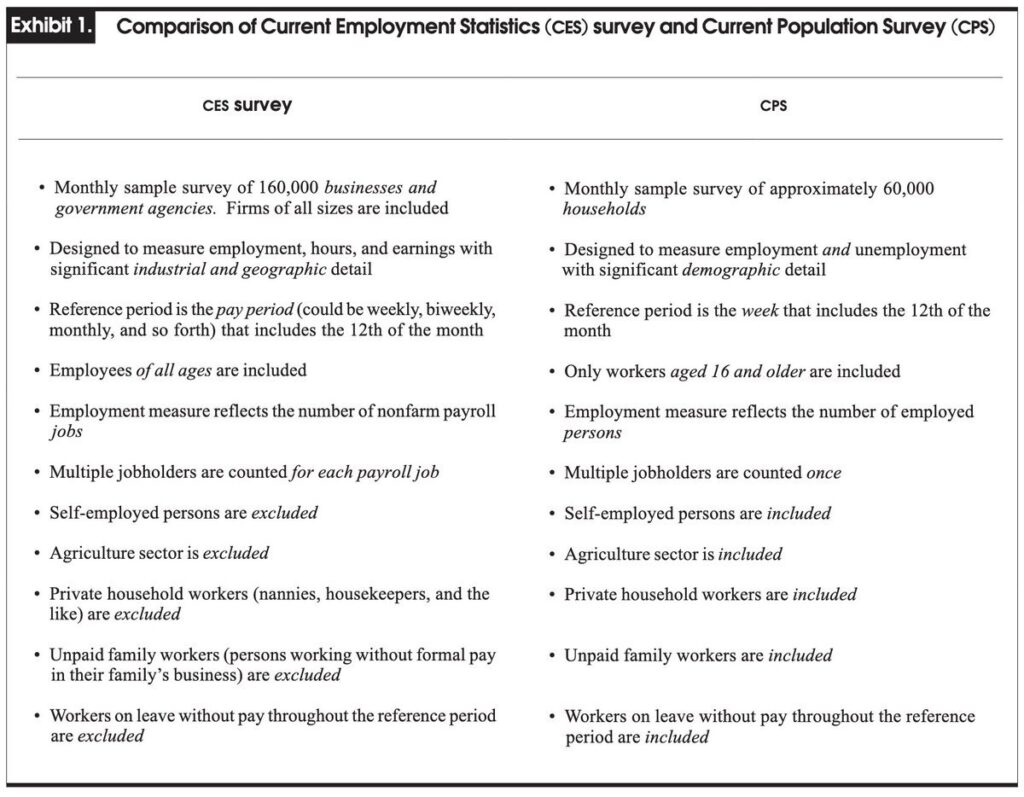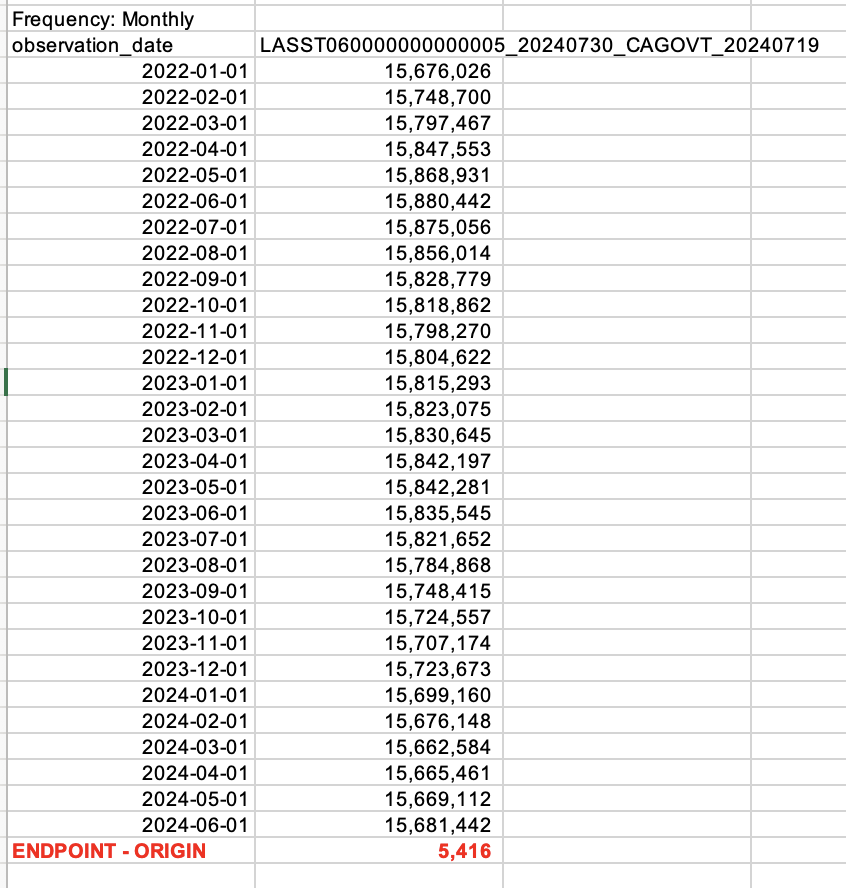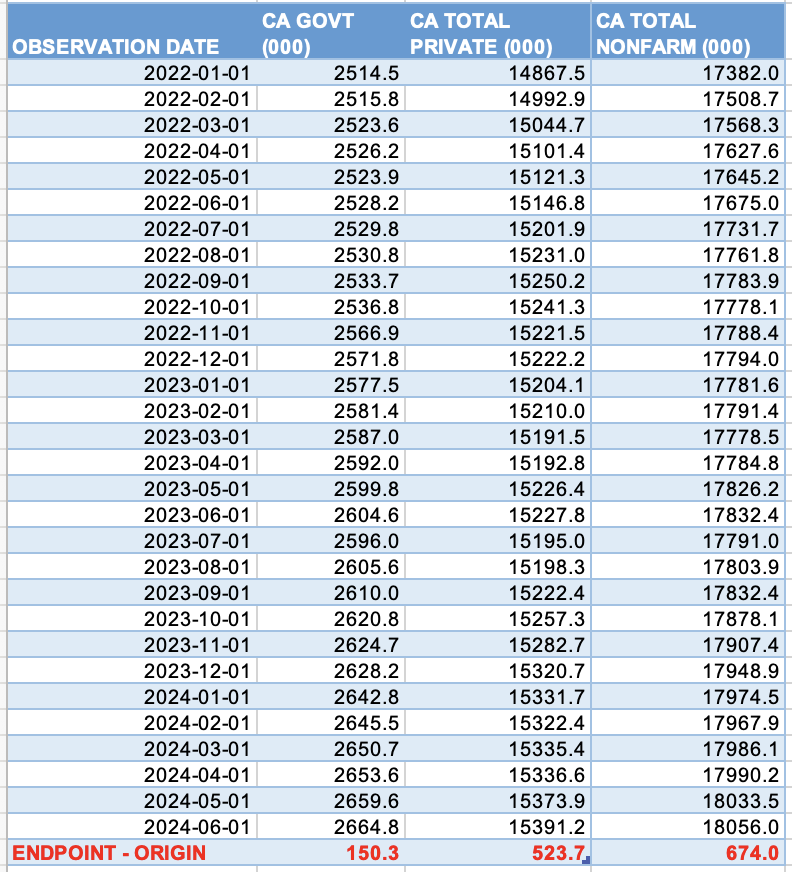@TBPInvictus here (link is now to Bluesky)
Let’s cut to the chase: A Hoover Institution analysis of California private job creation is off by a factor of 100. Between January 2022 and June 2024, the state created 523,700 private sector jobs — not 5,400 as claimed. MSM uncritically repeated the false number.
I spend far too much time debunking economic bullshit. *Sigh.*
Our story so far: Hoover Institution’s Lee Ohanian wrote a piece last April falsely claiming that California’s new minimum wage law had cost the state almost 10,000 fast food jobs. The story was false. Some sleuthing uncovered the fact Ohanian had inappropriately relied on data that was not seasonally adjusted. To his credit, he eventually walked his error back, but only when confronted by Michael Hiltzik at the LA Times.
Once again, Ohanian is back with another egregious data analysis error.
In an August piece — which laid dormant until recently going viral — Ohanian wrote the following:
Between January 2022 and June 2024, employment in US private businesses increased by about 7.32 million jobs.
Of these 7.32 million jobs, about 5,400 were jobs created in California businesses—representing about .07 percent of the US figure. Put differently, if California private-sector jobs grew at the same rate as in the rest of the country, they would have increased by over 970,000 during that period, about 180 times greater than the actual increase.
It is well known that California has been among the worst-performing states in the country in terms of job growth. But the latest statistics show that nearly all jobs that are being created in California are government jobs. Between January 2022 and June 2024, total California jobs grew by about 156,000, with government jobs accounting for 96.5 percent of that growth.(De-empahsis added; the statements that are untrue or questionable are struck through)
The first sentence is correct. Over the period cited, US private sector jobs grew from 127,958,000 to 135,274,000, a gain of 7,316,000. Everything else he wrote is either 1) completely wrong, 2) misleading, or 3) fabricated.
Professor Ohanian, who teaches at UCLA, determined that California added only 5,400 private-sector jobs over that period. He says, “The calculation for California private-sector jobs is derived from total jobs minus California government jobs.”
That’s an error: The “total jobs” link takes us to a BLS series (LASST060000000000005) derived from their Household Survey. From that, the good professor is subtracting “government jobs,” but that link takes us to a series that is derived from the Establishment Survey (SMS06000009000000001). Inappropriately mixing data from one BLS Payroll (Establishment) survey with data from another BLS (Household) survey is a cardinal sin of BLS data analysis.
If you mistakenly believe that the two surveys are somehow “the same thing” or data derived from one is interchangeable with data derived from the other, look below at the difference between the two with respect to overall payroll employment:
How does BLS explain the difference?
“The payroll survey (CES) is designed to measure employment, hours, and earnings in the nonfarm sector, with industry and geographic detail. The survey is best known for providing a highly reliable gauge of monthly change in nonfarm payroll employment. A representative sample of businesses in the U.S. provides the data for the payroll survey.
The household survey (CPS) is designed to measure the labor force status of the civilian noninstitutional population with demographic detail. The national unemployment rate is the best-known statistic produced from the household survey. The survey also provides a measure of employed people, one that includes agricultural workers and the self-employed. A representative sample of U.S. households provides the information for the household survey.”
So then how (and why) did Ohanian derive the “only 5,400 private sector jobs over 2.5 years” in California?
To ensure we’re looking at the proper vintage data, we’ll use FRED’s sibling, ALFRED, which allows us to pick a point in time and view the then-real-time numbers. What we see below is Employed Persons in California Vintage: 2024-07-30-(All Employees: Government in California Vintage: 2024-07-19*1000) . Employed Persons in California is from the Household Survey, while All Employees: Government in California is from the Establishment Survey.
Here’s the data just above in table form, and there’s your 5,400 down at the bottom:
What are the real numbers? Using the Establishment Survey only (as we should), we get a table that looks like this:
California added 523,700 private sector jobs over the period that Professor Ohanian claims they added only 5,400. He was only off by a factor ~100x.
I have covered above only the first two paragraphs of Professor Ohanian’s column. When an ECON 101 error is found that early, then the rest of the paper/column/post is to be disregarded as junk economics. Given Professor Ohanian’s previous sloppiness, I don’t have the bandwidth to plow through the rest.
Okay. maybe just one more graf.
California’s job creation record has been even more dismal over the last 18 months. Since January 2023, private-sector employment in the state declined by over 46,000 workers. California’s private-sector job collapse is unprecedented, and with the state representing nearly 12 percent of the country’s population, it is a drag on the nation’s economy.
I don’t know where the 46k loss comes from. Don’t care. Not going to investigate.
Okay. I lied again. He captured Employed Persons in California from Jan 2023-Jun 2024 from the Household Survey instead of, as below, from the Establishment Survey.
Private sector employment in California, January 2023-June 2024, Vintage 2024-07-19:
Ohanian is either a competent bad actor or an extremely incompetent economist. I’m not sure which.
Either way, there is an echo chamber in the social media world waiting with bated breath for news it can use, truth be damned. That “a lie can travel halfway around the world while the truth is putting on its shoes” has never been more true than it is today. And it’s a massive, massive problem. We see this with low-information voters, people who believe the stock market is not at all-time highs, that the unemployment rate is higher than it is, or that inflation is still high (prices are high, inflation is low). Misinformation is a problem so large it effects national elections.
I expect better from places like the Hoover Institute, and academic centers like Stanford and UCLA. Same about the Rip & Read media that blindly parrots faulty and dumb analysis.
Joan Robinson understood this nearly a century ago: “The purpose of studying economics is not to acquire a set of ready-made answers to economic questions, but to learn how to avoid being deceived by economists.”
[Amplifying this crap on social media are folks like CA Congressman Kevin Kiley, the California Globe (of course), futurist Steve Jurvetson, and many other right wing cranks. Shame on all.]
Previously:
Misunderstanding Seasonal Adjustments
See also:
The fast-food industry claims the California minimum wage law is costing jobs. Its numbers are fake (June 12, 2024)
Can Stanford tell the difference between scientific fact and fiction? Its pandemic conference raises doubts (Oct. 15, 2024 )
Sources:
Comparing employment from the BLS household and payroll surveys
California’s Businesses Stop Hiring, Lee Ohanian, Hoover, August 7, 2024







